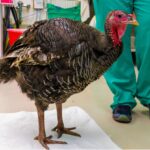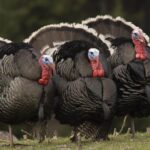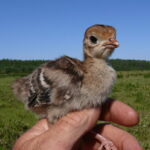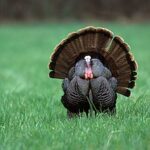When people think of turkeys, they often picture the traditional Thanksgiving feast. However, turkeys can also make interesting and rewarding pets. Known for their unique personalities, intelligence, and surprisingly affectionate nature, pet turkeys are becoming increasingly popular among bird enthusiasts. This guide will cover everything you need to know about keeping a turkey bird as a pet, including care tips, housing requirements, and the benefits of having a turkey as part of your family.
1. Understanding the Nature of Turkey Birds
Before deciding to keep a turkey bird as a pet, it’s essential to understand their nature and what to expect from them as companions. Turkeys are social creatures, often forming strong bonds with their owners and other animals. Unlike chickens, turkeys are curious, intelligent, and can be quite affectionate. However, they are also large birds, which means they require more space and care than smaller pet birds.



- Social Behavior: Turkeys thrive in social environments and enjoy interaction with humans and other animals. They can become very attached to their owners, following them around the yard and even responding to their names.
- Intelligence: Turkeys are smarter than most people realize. They can learn routines, recognize different people, and even solve simple problems. Their intelligence makes them engaging pets, as they often display unique behaviors and personalities.
- Affectionate Nature: Many turkey owners are surprised by how affectionate these birds can be. Turkeys enjoy being petted and may even cuddle with their owners. They are also known to make soft cooing noises when content, which adds to their charm.
2. Choosing the Right Turkey Breed as a Pet
When considering a turkey bird as a pet, selecting the right breed is crucial. While there are several breeds of turkeys, some are better suited for pet life than others.
- Broad Breasted Whites: This is the most common breed used in commercial farming, but they are not ideal for pets due to their size and health issues associated with their rapid growth.
- Heritage Breeds: Heritage breeds like the Narragansett, Bourbon Red, and Royal Palm are better choices for pets. These breeds are smaller, more active, and have longer lifespans than commercial breeds. They are also more social and can adapt better to living as pets.
- Miniature Turkeys: Some breeds, like the Midget White, are smaller and more manageable as pets. These turkeys have all the positive traits of larger breeds but are easier to care for due to their smaller size.
3. Housing and Space Requirements for Pet Turkeys
Turkeys are large birds that need plenty of space to roam, forage, and exercise. Proper housing is essential to ensure your turkey bird pet stays healthy and happy.
- Outdoor Space: Turkeys require a spacious outdoor area where they can move freely. A fenced yard or large enclosure is ideal. The area should have plenty of grass for foraging, as well as shaded spots where they can rest.
- Coop or Shelter: While turkeys enjoy being outdoors, they also need a secure shelter to protect them from predators and harsh weather. A well-ventilated coop with roosting bars is essential. The coop should be large enough to accommodate your turkey comfortably, allowing them to spread their wings and move around.
- Protection from Predators: Turkeys are vulnerable to predators like foxes, raccoons, and even dogs. Ensure that their enclosure is secure with fencing that prevents predators from getting in. Lock the coop at night to protect your turkey from nocturnal threats.
- Environmental Enrichment: Turkeys are intelligent and need mental stimulation to prevent boredom. Provide them with enrichment activities, such as foraging opportunities, toys, and areas to explore. You can also include logs, perches, and dust bathing areas in their enclosure.
4. Diet and Nutrition for Pet Turkeys
Feeding your turkey bird pet a balanced diet is crucial for their health and well-being. Turkeys have specific dietary needs that differ from other poultry.
- Commercial Turkey Feed: The best option for feeding your turkey is a commercial turkey feed that provides all the necessary nutrients. Look for feed specifically formulated for turkeys, as it will contain the right balance of protein, vitamins, and minerals.
- Supplementing the Diet: In addition to commercial feed, you can supplement your turkey’s diet with fresh fruits, vegetables, and grains. Turkeys enjoy a variety of foods, including leafy greens, berries, corn, and peas. These supplements provide additional nutrients and help keep your turkey’s diet varied and interesting.
- Grit and Oyster Shell: Turkeys need grit to help them digest their food. Providing a source of grit, such as crushed granite, is essential. Oyster shell should also be offered to ensure they get enough calcium, especially if your turkey is laying eggs.
- Water Supply: Always ensure that your turkey has access to fresh, clean water. Turkeys drink a lot of water, especially in hot weather, so check their water supply regularly and clean the water container to prevent contamination.
5. Health Care and Common Issues in Pet Turkeys
Like all pets, turkeys require regular health care and monitoring to ensure they remain healthy. Being aware of common health issues can help you take prompt action if your turkey becomes ill.
- Regular Health Checks: Regularly check your turkey for signs of illness, such as lethargy, loss of appetite, abnormal droppings, or respiratory issues.
- Vaccinations and Parasite Control: Depending on where you live, vaccinations may be necessary to protect your turkey from common poultry diseases. Consult with a veterinarian about appropriate vaccinations. Parasite control is also important, as turkeys can be susceptible to mites, lice, and internal parasites. Regularly check for signs of infestation and treat your turkey as needed.
- Foot Care: Turkeys can develop foot problems, especially if they spend a lot of time on hard surfaces. Regularly inspect their feet for cuts, swelling, or signs of infection. Providing soft bedding in the coop can help prevent foot issues.
- Preventing Obesity: Pet turkeys can become overweight if overfed or if they don’t get enough exercise. Monitor their weight and adjust their diet if necessary. Encourage activity by allowing them to roam and forage.
6. Interacting and Bonding with Your Pet Turkey
Building a strong bond with your turkey bird pet is one of the most rewarding aspects of keeping these birds. Turkeys are social and enjoy spending time with their owners.
- Socialization: Start socializing with your turkey from a young age. Spend time with them daily, talking to them and handling them gently. This will help them become accustomed to human interaction and build trust.
- Training: Turkeys can be trained to follow basic commands and even come when called.
- Understanding Body Language: Learn to recognize your turkey’s body language. A content turkey will often puff up its feathers, coo softly, or follow you around. Understanding their signals will help you respond to their needs and strengthen your bond.
7. Benefits of Keeping a Turkey Bird as a Pet
Keeping a turkey bird as a pet offers several benefits that go beyond their companionship.
- Natural Pest Control: Turkeys are excellent at controlling pests like insects and small rodents. They enjoy foraging and will naturally help keep your yard free of unwanted pests.
- Sustainable Living: Turkeys can be part of a sustainable lifestyle. They provide eggs, and if you choose, they can also be raised for meat. Their manure can be composted and used as fertilizer for your garden.
- Educational Experience: Caring for a turkey offers a unique educational experience, especially for children. They learn about responsibility, animal behavior, and the importance of caring for living creatures.
8. Conclusion: Is a Turkey Bird Pet Right for You?
A turkey bird pet can be a delightful and rewarding addition to your home if you have the space, time, and resources to care for them properly. Their intelligence, affectionate nature, and unique personalities make them wonderful companions. By providing the right environment, diet, and care, you can enjoy a happy and healthy relationship with your turkey bird pet for many years.
